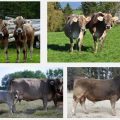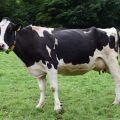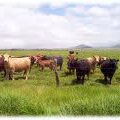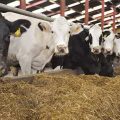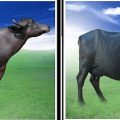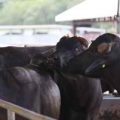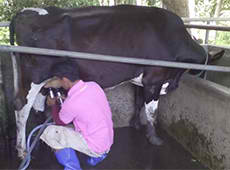
When are cows considered dairy cows? Are they still dairy cows when there is zero milk production? How can they produce if no one milks them? How can they be milked if none gets pregnant? Funny questions yet posed real problems in Cuenca.
Connoted as is, questions provide one life-long lessons and real-life practical skills specially when treated and analysed accurately. This guided Ms. Jasmin Marie Luce on her venture to dairy cow production including all the venture’s ups and downs.
In 2007, Cuenca invested in dairy cows. A total of ten (10) heads were bought for dairy production hoping to have established a demo farm. As Cuenca’s Municipal Agriculturist, Ms. Luce had hoped and highly visualized a farm that could facilitate learning to the municipal residents whose interest boil down to dairy production.
However, frustrations are always part of the formula. High hopes turned depressions for the investment was not sustained. That time, there was high mortality due to malnourishment as evident in the loss of two (2) cattle in just two (2) weeks.
Primarily, the loss was emanated from the disrupted support of the local government. It affected the farm’s overall operation leading to a cut in capital and probably, profit. But just as formulas have certain solutions, back in 2014, hers was unravelled through the ATI-International Training Center on Pig Husbandry.
Though focused on pig husbandry, the Center also caters to different livestock commodities to best help and capacitate farmers. The Center’s Senior Agriculturist Mr. Ramil Ostil or ‘Sir Ming’ as he’s commonly known for, took initiatives in reviving and reconciling issues and concerns to which the farm was bound, through introduction of the Government Assisted Training Arm Support (GATAS) project. Yearly, the GATAS benchmarked training on cattle milk production to three (3) target municipalities.
So, how did it all start? Agape Church started it all.
Upon hearing that Church members’ children are supplemented with fresh milk from their two (2) cows, Sir Ming then visited and aimed it improved. Sadly, on their ocular visit, the farm was found of no use, no milk production as none gets pregnant and only animals’ poor health condition was prevalent.
So, how did it go?
For seven months (2 days per week), farmers were trained on dairy production. After dairy farm management, feeding, reproductive deficiencies, better milk production and milk hygiene were also taught. Known to be the key for successful milk production, forage production was emphasized basically because it is the most vital component for the animals’ health. A ‘Farmers Field School (FFS) on Forage Production: Developing Forage Technologies’ was initiated totwelve (12) farmers which provided them avenue to identify root causes of their cows’ unproductivity and furthered their skills in dealing with it.
“Mula sa training natutunan namin lalo’t higit ng mga kasama ko na nangungumpay ang tungkol sa forage, mula sa pagtatanim, pag-aani at ang kahalagahan ng tama at wastong pakain sa baka”, said Ms. Luce. “Sila na mismo ang nakakaalam pagdating sa field kung ano ang kukumpayin nila, nagtatanim na rin sila ng mga grass at legumes na magandang pakain”, she added.
At fourteen (14) cattle on April 2014, the demo farm produced their very first milk on December when a cow got pregnant after the training. They did their first fresh milk pasteurization on January 2015. As of summer, twenty three (23) heads were already housed in the farm; nine (9) of which were produced after the FFS. To date, six (6) in the flock are already producing milk. From zero milk production, an average of ten (10) kilos per day is produced from each head. This paved way to the establishment of feed forage garden, enabling visitors and farmers to see various grass and legumes that served cattle’s feed.
True enough that great things happen when one knows how to wait. But even greater things come to those who never waited at all.
Ms. Luce never wasted her time looking for solutions. Good thing she found ATI-ITCPH which unselfishly handed all formulas for her and her colleagues to figure out solutions to the problem.
Through sustainable milk production, the demo farm now earns a net income of thirty thousand (P30, 000.00) per month. They purchased a portable milking machine that can milk two cows at a time. This gave Ms. Luce the idea of utilizing their produce to feed selected school children in the locality.
Conscious about their production’s environmental impact, they attended ‘Course on Organic Agriculture for Livestock Technician’ and ‘School on-the-Air Program on Climate Smart Livestock Production’. This eliminated their consumption of synthetic chemicals which opened doors to Foliar Fertilizers such as Fermented Plant Juice (FPJ), Fermented Fruit Juice (FFJ) and Fish Amino Acid (FAA) for their plants and Lactic Acid Bacteria Serum (LABS) for their animals.
Moreover, the farm’s manure was used for vermicomposting maximizing its overall value chain. Its vermi-compost was then applied as fertilizer for their green house.
To ensure sustainability, farmers were taught silage-making to prevent scarcity during draught. Learning how to prepare it has made their subsistence well-going.
Indeed all efforts, time and financial support were definitely worth it as evident in the farm’s major transformation. Want to know what formula they applied?
It was, malnutrition, high mortality and zero milk production minus proper training, awareness and collective efforts equals efficient and successful cattle production. More to this, they were able to provide quality extension through their feeding program.
So, what was Ms. Luce’s though about this? “It was, is and will always be the right formula for us. No further questions about it.”, she proudly uttered.
You, do you already have a formula?
by
